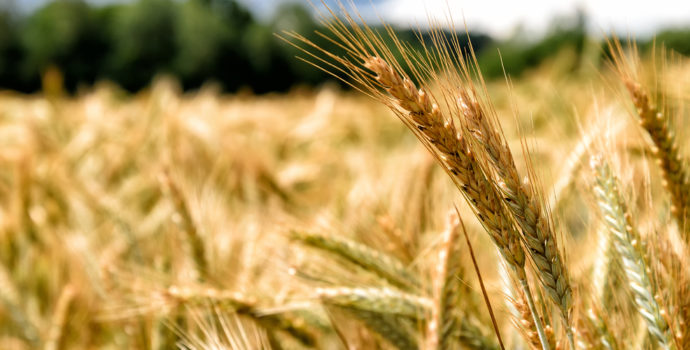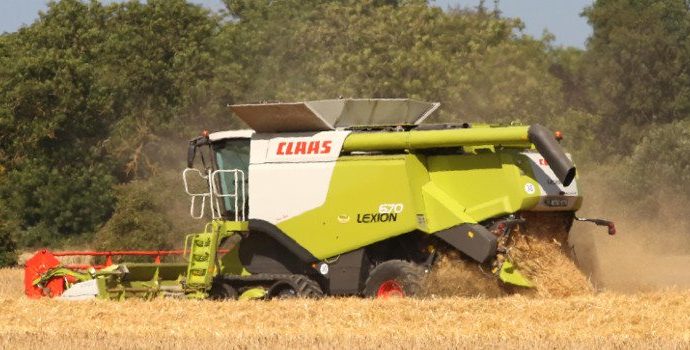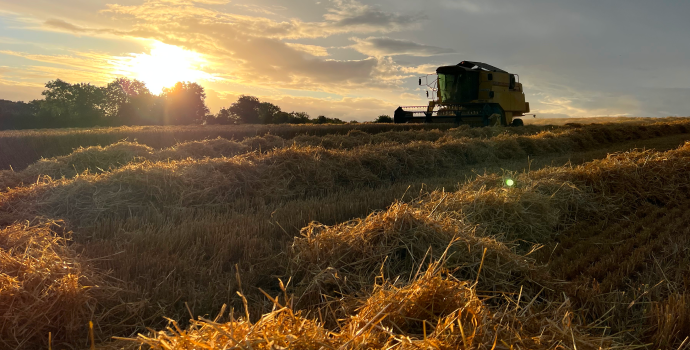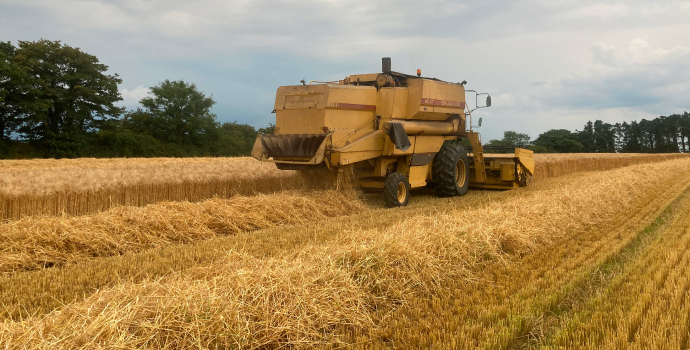Grain Council Report September 2020
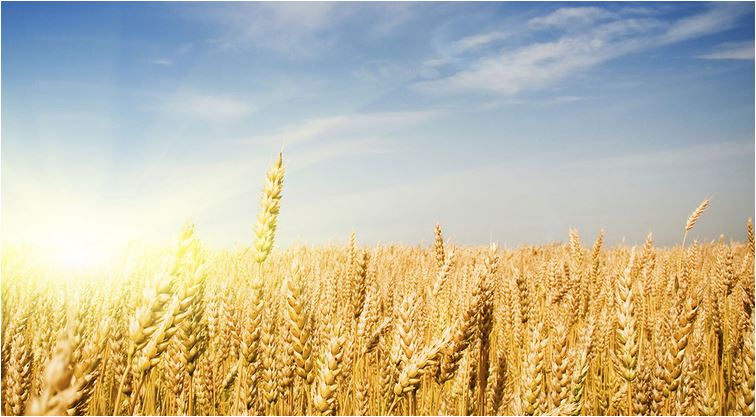
Domestic Market
Tillage farmers received a much-needed reprieve with the recent spell of drier weather. Up until last week approximately 50% of the main cereal’s crops were harvested, with progress nationwide now closer to 70% at this stage. However, it came too late for many, with the recent storms and rainfall causing significant yield and quality reduction in areas. Some areas in the south and south east have received 160mm of rain in August, which is 60% more than the norm.
Yields continue to be very variable. Where crops had good potential there are reductions of up to 30% in yield due to the inclement weather throughout August. Some crops have yielded better than expected however in general straw yield has been very disappointing.
Grain prices have strengthened by €3 to €5/t, with green harvest prices for barley and wheat in the range of €145- €150/t and €165 – €170/t respectively. Prices have been helped by the strength of wheat and the surge in import maize prices. A stronger sterling and the broken harvest in the UK, have left farmers reluctant sellers which has also supported Irish prices. The future direction of Irish prices still depends on the international maize markets and the UK barley export situation in particular. The UK will have to import wheat but will most likely have to export barley.
With US maize prices increasing by 10% in recent weeks the EU Commission has again removed the import levies on maize having only imposed the 5.48 €/t duty on 12th August.
Continuing large export sales of French Wheat and Barley to China has supported the FOB Creil price for malting barley. With only 2 weeks remaining of the pricing model, the average price remains at €173/t. Both the lack of, and excessive rainfall at crucial times in the season, along with the impact of Covid has left it a very poor year for malting barley production.
International Markets
EU wheat prices have gained recently on continuing news of good demand and reduced wheat harvests in France, UK and the Ukraine. The Matif wheat price is at a five-month high of €188/t. Drought is still continuing to affect wheat planting in Argentina however these bullish signals in the market are tempered by the expectations of good harvests in parts of Eastern Europe, Russia, the US and Australia. In contrast to wheat, barley production in the EU is down only 2% compared to last season. With demand and supply quite balanced at this stage some commentators in the market think that grains may have peaked in the short term at least.
Chicago maize futures have climbed by over 16% in the past month reaching five-month highs. The continuing dry conditions in the US Midwest, and reduced production forecasts in the EU and Ukraine have lowered world maize output forecasts. Increased demand from China for US product have also helped to drive prices higher.
The second corn harvest in Brazil (Safrina harvest) is on track to reach expected output. Other factors which may cap corn prices are reduced ethanol demand in the US, high world production and the weakness in South American currencies which leaves these exports cheap in dollar terms
US soybean futures market rose by 6% in the past week due to the same factors which have affected maize. US sales to China are near record levels for this stage of the season. All protein and vegetable oils have risen in tandem. Regarding rapeseed, the jump in soybeans has supported the market however, good EU and Canadian production figures have capped any further gains.
Activity since last National Council
- IFA President Tim Cullinan visited tillage farms in County Carlow, to view at first hand the poor harvest this season. He called on all grain merchants to pay sustainable prices this harvest. Quality assured Irish grain must not continue to be dictated by the price of third-country feedstuffs, which do not conform to the regulatory and environmental standards, demanded by the EU Commission and the Irish Government”.
- Due to the deterioration in harvest conditions in recent weeks the President called on DAFM to undertake an immediate assessment of the damage that has been done.
- Members of the grain committee met Glanbia and Diarygold to discuss issues in the sector, including the need to pay sustainable prices this harvest. The plight of growers with poor yields was emphasised.
- A number of grain merchants and feed mills were visited to ensure they prioritise Irish grain and pay sustainable grain prices to Irish tillage farmers.
- IFA organised a protest at Waterford port at to highlight the importation of malt which had the potential to undermine the Irish malting barley sector, particularly during this difficult year.
- Following the protest there was a high-level meeting between the IFA president, Grain Chairman and the CEO of Boortmalt to discuss issues arising from the protest.
- IFA called on all maltsters to maximise the intake of Irish grain by introducing derogations on specs wherever possible.
- IFA has again called on the new Government to support the tillage sector and will look for a meeting when the new agriculture minister when announced.
- Covid 19 has continued to have a severe impact on the tillage sector, particularly on the feed and malting barley sectors. IFA have continued their contact with DAFM regarding potential supports for growers of malting barley who have been indirectly affected by continued closure of many pubs.
- The grain committee has continued discussions with the seed companies regarding derogations to ensure maximum intake of Irish seed.
- A full face to face meeting of the grain management committee following all NPHET guidelines took place in the Farm Centre Dublin. Have been held online.
- A number of IFA grain market reports were issued to all grain members to update on local and international harvest and market developments.
- An online meeting was organised with Bord Bia to raise issues around the need to include the use of Irish grains in all Bord Bia livestock standards and any PGI schemes
- Members of the IFA straw committee visited the Northway compost yard in Tyrone to discuss the use of Irish straw in their compost product and the need for sustainable long-term straw prices.
- Tillage Industry Ireland of which IFA is a member, launched a report on the Tillage Sector in Ireland https://www.ifa.ie/tillageEIA. The report highlights the contribution of the sector to the national economy, with €650m of direct farm output and €1.3bn of overall output.
- An online meeting was organised with UCD to discuss their ongoing research into the use of Irish grain and protein crops in dairy cows.
EU/COPA developments
- IFA made a contribution to the EU commission objecting to the decision of Austria to ban the use of glyphosate. The commission have postponed their decision until the end of the year.
- IFA, along with Copa.Cogeca, are continuing their lobbying in Brussels regarding the reapproval and authorisation of a number of vital PPP’s.
- IFA made a submission to the EU Commission on The Combined Roadmap for the Evaluation of the EU Legislation on the Sustainable Use of Pesticides.
- The Farm to Fork Strategy element of the European Green Deal is aiming to make food systems fair, healthy and environmentally-friendly. IFA have highlighted that there is nothing fair about targets in the Green Deal, which will increase the regulatory burden and undermine local tillage framers while continuing to allow access to non-EU feedstuffs produced to different standards.
- IFA has continued lobbying on proposed changes in the new CAP.
Upcoming Issues/Events
- IFA will continue to lobby for supports to tillage farmers most affected by the weather and the Covid 19 pandemic.
- Meeting to be arranged with Teagasc regarding the inclusion of more Irish grains in Dairy rations.
- IFA will continue to contact the mushroom composters regarding procurement of Irish straw.
- CAP 2020 continues to be a major issue for the viability of the Grain sector and the Grain Committee will be working on this in the coming months.
- IFA is continuing to work on a labelling standard regarding the inclusion of native grains and will continue its campaign on greater inclusion of native grains in feed rations.
- IFA will participate in meetings of the Copa.Cogeca cereals working party and the EU Commission Civil Dialogue Group on Cereals and Oilseeds next week. The impact of the proposed Green Deal (Farm to Fork & Biodiversity strategies) and the new CAP will be the main item on the agenda of both meetings. The Grain Chairman Mark Browne will raise the issue of imports of third country maize and protein crops.
| Chairman | Mark Browne |
| Executive | Patrick Farrell |

